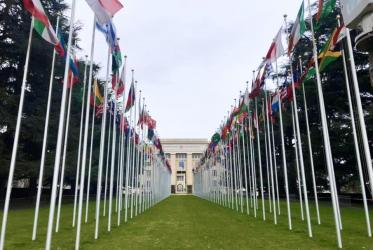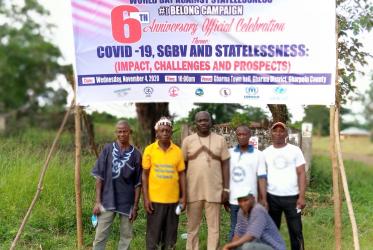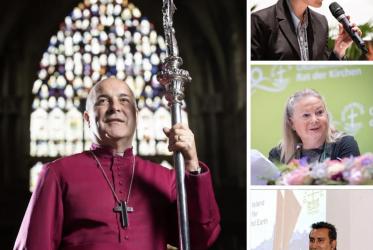2018 Global Peace Forum on Korea: Peace and Prosperity for Korea and the World, New York, 29 September 2018
Keynote address by Peter Prove, Director of the Commission of the Churches on International Affairs, WCC
The Korean War 1950-1953 claimed millions of lives. More than 60 years ago that war paused with the signing of an armistice, marking the suspension of the hot war on the Korean peninsula. But an armistice is not a peace, and the suspended state of war in the region has provided a fertile context for the perpetuation of Cold War era hostilities and tensions, for the continued division of the Korean people, and the highest risk of catastrophic conflict regionally and globally.
For the World Council of Churches, our engagement in the search for peace, reconciliation and reunification of the Korean peninsula – and in the promotion of inter-church encounter and dialogue between North and South Korean Christians together with church partners from around the world – dates back more than 30 years. In particular, it dates back to the ‘Tozanso Consultation’ on “Peace and Justice in North-East Asia: Prospects for Peaceful Resolution of Conflicts”, convened by the WCC in October 1984, near Gotemba-city, Japan.
Despite its deliberately generic title, this consultation was the expression of efforts to put the challenge of peace and reunification of the Korean peninsula on the international ecumenical agenda and to promote dialogue between North and South Koreans. At the time, South Korea was governed by a military dictatorship under whose national security doctrine contact with North Koreans was subject to draconian punishments. Those who proposed or discussed reunification were often arrested and sometimes tortured. Reflecting this political context, South Korean churches were either strictly opposed to – or at best cautious of – contact with North Korea.
Nevertheless, following a process of careful and deliberate discussion and preparation, and after having secured assurances against reprisals targeting South Korean participants, the most senior representatives of all WCC member churches in South Korea participated in the Tozanso consultation, to which representatives of both the Korean Christians Federation (KCF) of North Korea had also been invited. Though the KCF was ultimately not able to take part in the consultation, they followed the process, and remained in close communication. But the participating South Korean church leaders in the consultation joined in an agreement that:
The WCC, in collaboration with the CCA (Christian Conference of Asia), (should) seek to facilitate opportunities where it would be possible for Christians from both North and South Korea to meet in dialogue.
Christians and government officials in both parts of Korea recognize Tozanso as the first opening on a non-governmental – but officially acknowledged – level between North and South. And it was to lead to many more firsts, including:
- The first official direct ecumenical contact with the KCF, established during a WCC senior staff delegation visit to the DPRK in 1985.
- The first direct encounter between North and South Korean Christians since the war, in Glion, Switzerland, in September 1986.
- Visits by delegations from the National Council of Churches of Christ in the USA (NCCCUSA) to both Koreas in 1986 and 1987. The NCCCUSA also launched a campaign to encourage the US government towards a comprehensive peace settlement in Korea.
- In 1989, a KCF delegation was hosted by the NCCCUSA, the first time since the war that a North Korean group was granted visas to visit the USA.
- In the same year a KCF delegation attended the German ‘Kirchentag’ in West Berlin.
- And back in South Korea, the National Council of Churches in Korea (NCCK) had issued a courageous “Declaration of the Churches of Korea on National Reunification and Peace” in February 1988, and in April that year the NCCK convened a major international consultation on this issue in Incheon, the first such event to deal openly and publicly with this question within their country.
- In 1993, the KCF Chairperson met with President Bill Clinton and other senior Administration officials.
Recounting these historic developments from past decades serves to illustrate just how much momentum has been lost in the intervening period of political confrontation, and how far we still have to catch up in the search for peace.
When famine struck North Korea in the 1990s, one of the WCC staff members who had pioneered this engagement – Canadian Erich Weingartner – received a visa from the DPRK authorities enabling him to spend more than two years living and working in North Korea as the founding head of the Food Aid Liaison Unit (FALU) under UN World Food Programme auspices.
Another staff member responsible for leading this process – South Korean Park Kyung-seo – during his 18-year tenure at the WCC in the 1980s and 1990s had visited North Korea 26 times, met President Kim Il Sung twice, and channelled USD 43 million in humanitarian aid and assistance to the DPRK. He subsequently served as South Korea’s Ambassador-at-large for human rights between 2001-2007. Now the same Park Kyung-seo serves as President of the South Korean Red Cross.
Following the experience of ecumenical humanitarian assistance to the people of North Korea during the famine, an Ecumenical Forum for Peace, Reunification and Development Cooperation on the Korean Peninsula (EFK) was launched in 2006 as a network of churches, national councils of churches, mission organizations and church-related development agencies in cooperation with the WCC, Christian Conference of Asia (CCA) and other ecumenical bodies, convened by the WCC. The primary aims of EFK are:
- To strengthen ecumenical participation in the efforts for peace and reunification on the Korean peninsula as well as peace in North-East Asia; and
- To promote effective development cooperation in North Korea on the basis of mutual trust and transparency through sharing of resources and experience in the ecumenical community.
At the WCC’s 10th Assembly in Busan, South Korea, in Oct-Nov 2013, the worldwide ecumenical movement re-committed itself to intensified support for and engagement in efforts for peace, reconciliation and reunification of the Korean Peninsula, in order to help counter the dangerous geo-political trajectory towards militaristic confrontation.
Since the 10th Assembly, this area of WCC’s work on behalf of the ecumenical movement has indeed greatly intensified, reflected in a series of initiatives, including:
- A conference in Bossey, Switzerland on 17-19 June 2014, on the 30th anniversary of the Tozanso Consultation, involving church leaders from 34 churches and related organizations from 15 countries, including delegations from the KCF in North Korea and from the NCCK in South Korea, seeking ways to advance reconciliation and peace on the peninsula.
- A 12-person international ecumenical delegation visit to the DPRK on 23-30 October 2015. The delegation was comprised of members and observers of the EFK, including participants from South Korea, and traveled south to Kaesong – and the demilitarized zone at Panmunjom – and north to Hyangsan, as well as in Pyongyang. During the delegation visit, a formal meeting of the EFK meeting was convened in Pyongyang on 28 October 2015, the first time an international ecumenical gathering of this nature was able to meet on Korean soil – North or South – with the official participation of both KCF and NCCK.
- An international ecumenical conference on a peace treaty for the Korean Peninsula, convened by the WCC in Hong Kong SAR, China, on 14-16 November 2016, with 58 participants from churches and related organizations from both North Korea and South Korea and 11 other countries. The conference inter alia issued a communique reaffirming a WCC 10th Assembly statement that “it is the right time to begin a new process towards a comprehensive peace treaty that will replace the 1953 Armistice Agreement”, and proposed that future ecumenical initiatives with regard to the Korean peninsula be purposefully and explicitly configured so as to model and exercise leadership towards a process for a peace treaty to replace the Armistice Agreement.
- A meeting by the WCC General Secretary Rev. Dr Olav Fykse Tveit with the newly-elected South Korean President Mr Moon Jae-In in Seoul on 30 May 2017, to offer the ecumenical movement’s support for and engagement in new initiatives for dialogue and peaceful coexistence on the Korean peninsula.
- A high-level international ecumenical delegation visit to both South and North Korea at the end of April/beginning of May 2018 – immediately following the Panmunjom Summit – including substantive discussions both with South Korean Minister of Unification Cho Myoung Gyon and President Kim Yong Nam of the Supreme Peoples’ Assembly in the DPRK.
- A visit by a KCF delegation to Geneva in June 2018, immediately following the Singapore Summit, to take part in the WCC 70th anniversary celebrations and Central Committee meeting (including an encounter with Pope Francis), and a subsequent EFK meeting.
The WCC strongly supports the political steps towards dialogue and peace taken through the Panmunjom and Singapore Summits. The WCC Central Committee at its meeting in June 2018 acknowledged “how closely the commitments expressed in the Panmunjom Declaration match the key focuses and objectives of over three decades of ecumenical advocacy for peace and reunification of the Korean Peninsula,” including with regard to:
- promoting dialogue and negotiations, and alleviating military tensions and confrontation;
- resolving the humanitarian issues that resulted from the division of the nation, including the reunion of separated families;
- improving and cultivating inter-Korean relations, and encouraging more active cooperation, exchanges, visits and contacts at all levels;
- declaring an end to the Korean War, and replacing the 1953 Armistice Agreement with a peace treaty;
- turning the Korean Peninsula into a nuclear-free zone through complete denuclearization; and
- promoting economic growth and co-prosperity, and to actively implementing the projects previously agreed in the 2007 October 4 Declaration.
The WCC especially appreciates the leadership of President Moon Jae-In and of Chairman Kim Jong Un in the series of inter-Korean summits that have laid the foundations for peace in the region, and we join in hope-filled affirmation of their steps towards the reduction of nuclear-armed military confrontation, towards peaceful co-existence on the Korean Peninsula, and towards the resolution of the long, painful and tragic division of its people.
We welcome the commitment to nuclear disarmament and the complete denuclearization of the Korean Peninsula expressed in the Panmunjom Declaration and reaffirmed in the Singapore Summit Joint Statement, in the context of the ecumenical movement’s support for nuclear disarmament globally, in particular through the ratification and implementation of the Treaty on the Prohibition of Nuclear Weapons (TPNW).
We believe that on the denuclearization issue, as well as on other difficult issues such as human rights and religious freedom, dialogue and engagement offer a far better and more productive path forward than coercive and confrontational approaches, which indeed are actually far more likely to increase the risk of conflict than to promote peace and positive progress.
In this moment of new fragile hope, the WCC is convinced that efforts for a peace treaty to replace the Armistice Agreement should have paramount importance – as a means of drawing a line under the painful history of the Korean War, and encouraging a fresh engagement with the current realities of the peninsula. We believe that the process of negotiating a peace treaty should not be postponed to encompass the resolution of all the current challenges and disputes, but that embarking now on the process of negotiating a peace treaty will produce a ‘peace dividend’ and would help build the confidence and trust that would enable those current challenges to be addressed. We are therefore urging WCC member churches and partners – especially those in North and South Korea, USA, China, Russia and Japan – to actively support and advocate for swift steps for a peace treaty for the Korean Peninsula.
Peter Prove,
Director of the Commission of the Churches on International Affairs,
World Council of Churches





